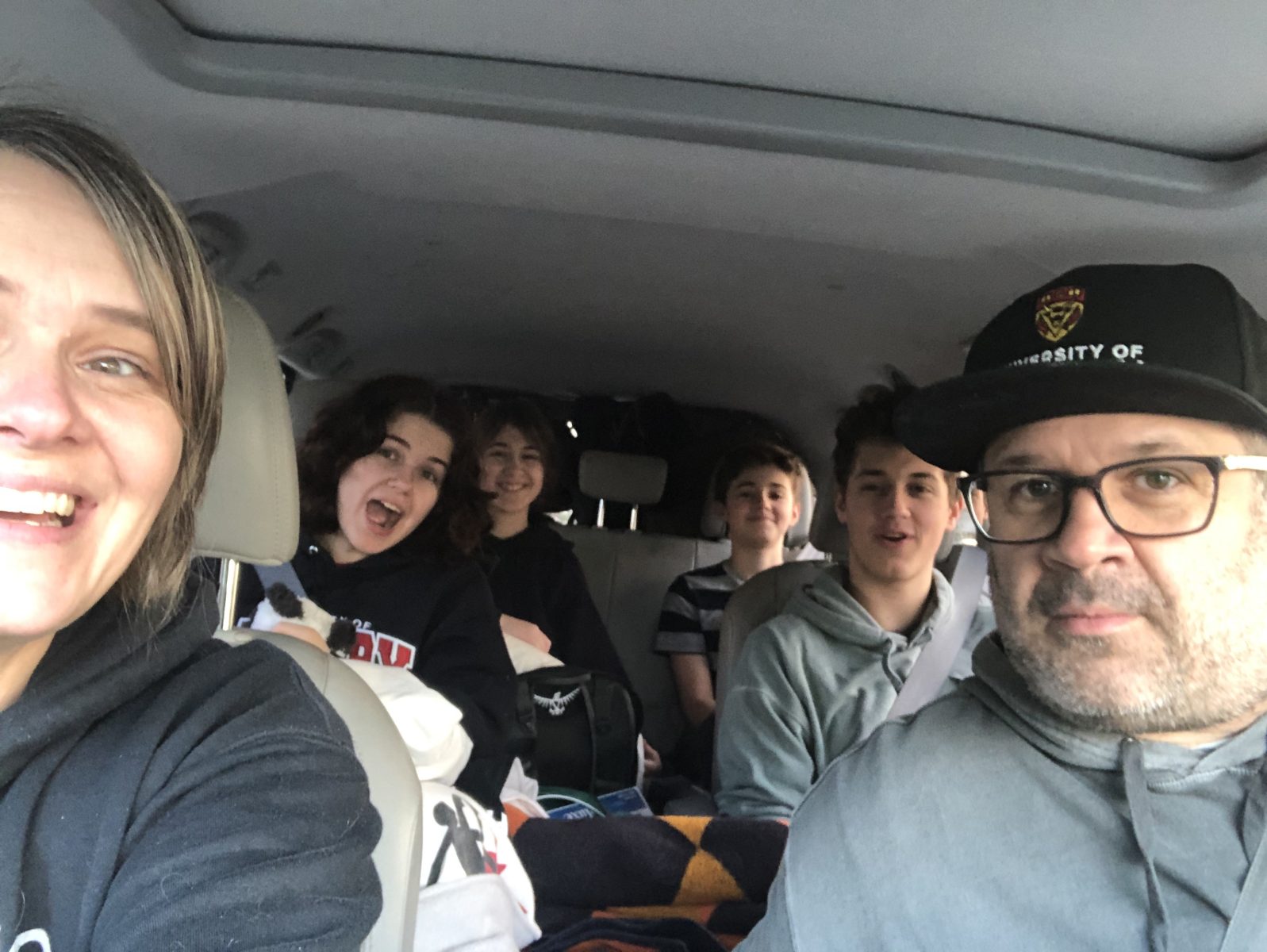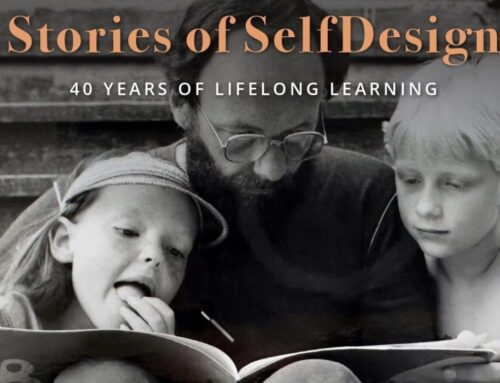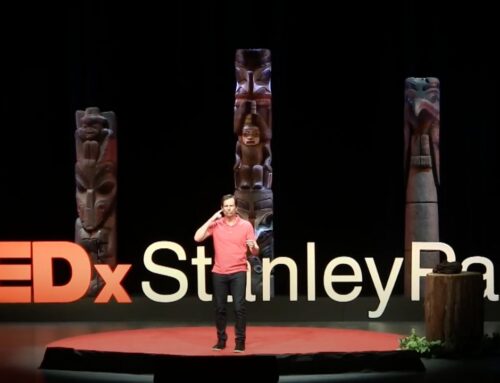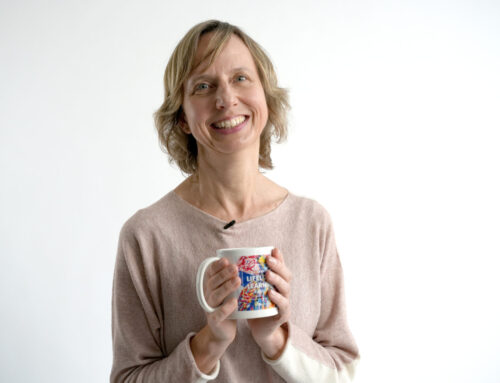It’s always bittersweet when a member of our community leaves. It’s bittersweet because, even as we wish them all the happiness in the world, we are also saying goodbye.
It is with bittersweetness that we wish Nikki Kenyon all the best in her next adventure, as she brings to an end 15 very active and influential years with SelfDesign.
Her roles have included both learning consultant and SelfDesign parent. As a member of our Education Services and Support Services teams, she has assisted and supported her educator–colleagues. In 2016, she joined SelfDesign Learning Community’s Principals team, first as vice principal, then as principal the following year. She became SelfDesign Learning Foundation’s Chief Learning Officer in 2021, helping us prepare for and overseeing the recent transition to our new learning management system, leading work for SelfDesign to become one of the independent provincial online learning schools that will begin operating across B.C. next September, and helping guide the creation of our newest educational program, HomeLearners Network.
We sat down with her before she left to talk about her own SelfDesign experiences and the changes she has seen occur and been part of.
The following conversation has been edited for clarity and length.
SelfDesign (SD): You’ve been with SelfDesign for 15 years. What are some personal highlights of your experiences here?

Nikki: SelfDesign has been a huge part of my life and my family. I raised my babies in this organization. Of course, they were SelfDesign learners, but also I had my younger two while working here. Over my first years here, I learned so much from the families whom I was working with about how to be a better parent — and also how to be a better learning consultant.
I had some really wonderful families my first year. They were so patient as I became familiar with this way of supporting learners and families one-on-one. When one of my first learners graduated a few years back, I wrote to her family to thank them for our first year together and acknowledge the profound impact they had on me in terms of how I was able to support all of the learners who came after their child.”
One of the beautiful things about SelfDesign is that you’re always learning and you’re always getting back as much as you invest in this community. That was really clear to me in the early days — that here was a community of support around me and around my family.
SD: What led you to join SelfDesign Learning Community’s Principal team in September 2016?
Nikki: When Brent Cameron, SelfDesign’s founder, passed, the organization went through a bit of turmoil — as organizations often do at the passing of a founder, right? When you have a founder-led organization and they are no longer leading the organization, an identity crisis can happen in the organization. I’ve seen that in more than just our organization.
With SelfDesign at that time, there came a point when I was asking myself, “I wonder if this is still the right fit for me? I wonder if it’s going to continue?”
Then they posted the vice principal position, and I thought, “If I’m going give this another year to see how it goes, and if I feel so passionately about this organization and its philosophy and approach, should I not be actively engaging in making this organization work – in helping to settle some of the turmoil and assisting in leading this organization?”
That’s what led me to step into leadership. And in becoming vice principal, I felt a sense of responsibility for where we would go next and we were going to move forward.
That was also around the time that Kathleen Forsythe, who was principal, was preparing to retire. I had just become vice principal, and we hadn’t found a replacement for her. At that point I said to Kathleen that we hadn’t found her replacement, and she said, “Oh, yes, we have.”
I became principal in January 2017. It wasn’t something I had intended at all, but I have been grateful for the opportunity, and challenge, ever since.
SD: Tell us about some of the key changes SelfDesign experienced during your time on the Principals team.
Nikki: The first thing we did was integrate our three programs. At the time, we offered a kindergarten to grade 9 program, a Support Services program, and a grade 10 to 12 program. Each program had different educators, different administrators and different leadership. They each used a different email system, a different learning management system, a different set of rules for how we did things, and more!
We worked hard to remove those differences and to build this single, cohesive kindergarten to grade 12 program that we now call SelfDesign Learning Community.
We also embedded Support Services within all aspects of the school, rather than having it as a separate program or side stream. Now, anytime we develop an offering or set up an event or anything, we ask ourselves, “What does Support Services need? How can we centre that?” Because when you work to support the needs of your most vulnerable population, you will meet the needs of everybody else.
We also revamped our grade 10 to 12 offering. Soon after I started as principal, the BC Ministry of Education and Child Care changed its curriculum, which gave us the nudge. We developed the integrated, learner-centred offering we currently offer that is true to the SelfDesign philosophy and meets the Ministry of Education and Child Care’s requirements.
It was a huge undertaking. It took several years, and many, many people poured their hearts and souls into making it happen.
And then the pandemic came, and with the lockdowns and the shift to online learning that occurred in the first year in B.C. and beyond, we saw another opportunity to meet our mission and offer the excellent, high-quality online learning opportunities SelfDesign has become known for to a much broader audience. HomeLearners Network is the result.
SD: The provincial context for education — in particular, online education — has changed in recent years. What were some of those changes and how have they affected SelfDesign?
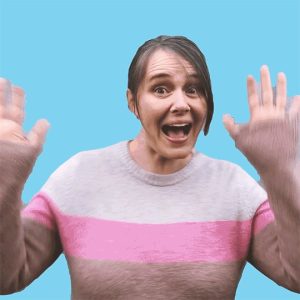 Nikki: A key contextual change for us happened when the BC Ministry of Education and Child Care changed its curriculum in about 2017, moving from a curriculum where learners had to demonstrate knowledge in particular subject areas to a competency-based curriculum. With the new curriculum, every school in B.C. had to focus on building core competencies in their learners. But this change aligned perfectly and naturally with what we’d been doing since at least the mid-2000s. When the Province adopted that approach, we were able to shine because we already had many years of experience offering competency-based learning opportunities.
Nikki: A key contextual change for us happened when the BC Ministry of Education and Child Care changed its curriculum in about 2017, moving from a curriculum where learners had to demonstrate knowledge in particular subject areas to a competency-based curriculum. With the new curriculum, every school in B.C. had to focus on building core competencies in their learners. But this change aligned perfectly and naturally with what we’d been doing since at least the mid-2000s. When the Province adopted that approach, we were able to shine because we already had many years of experience offering competency-based learning opportunities.
But the contextual change went deeper than that. For a long while, the Province didn’t really know what to do with online education — they wanted it, but they didn’t know what they wanted it to look like. And they certainly didn’t seem to know what to do about SelfDesign, which has such a unique approach to learning.
Our Learning Experiences Library helped us to start bridging that gap. I helped design the original library, and we started implementing it at around the time I became vice principal. The library checked all the Ministry of Education and Child Care’s boxes at the time as an online learning program but still allowed learners to explore different topics and find their way to their own interests and delve more deeply into those, as fits our approach. The Learning Experiences Library showed the government that we were providing a program that met their definition of “program,” and it allowed us to speak their language, while allowing the flexibility our approach needs without being administratively onerous.
A key focus for SelfDesign Learning Foundation President and CEO Amber Papou, the Principals team and I since then has been to find more and other ways to build a solid relationship with the BC Ministry of Education and Child Care while remaining true to our organizational values, beliefs and philosophy.
SD: How has that effort paid off?
Nikki: I think it is paying off. People in the Ministry now know who we are and what SelfDesign does. They seem willing to listen to us and even to go to bat for us. Even with the Province’s new guidelines for online education in B.C. coming into effect next year and with all the other changes we’ve seen over the last couple of years and are likely to see going forwards, SelfDesign is now part of the landscape. We’ve had two BC Ministry of Education and Child Care audits, as well as inspections or monitoring visits every year, since I’ve first became principal, and because of the efforts we’ve made to use the Ministry’s language, work with their curriculum and support our success with data and metrics, SelfDesign was in a strong position. In fact, we’ve received multiple glowing commendations from the Ministry.
It helps that we have the data and metrics to back up what we’re doing – our course completion rates and so on. We also have so much anecdotal feedback from families about the impact of our programs and approach on their lives and their families and their children.
We must be doing something right. In 2019, the Ministry asked me to join the inspection team for independent online schools. It was a signal the Ministry recognizes what we’re doing and is interested in leveraging our expertise to help other independent online schools in B.C.
SD: What else has shaped the broader educational context that has affected SelfDesign?
Nikki: The 2016 publication of the Truth and Reconciliation Commission’s findings and recommendations has been really important. The Province – and by extension, the BC Ministry of Education and Child Care – has officially committed to reconciliation. But in 2016–2017, shortly after the commission published its report, SelfDesign struck an Indigenous education task force that included First Nations elders, and parents and educators who identify as Indigenous to review all of our offerings in the context of the commission’s recommendations. The task force committee came up with their own recommendations on how SelfDesign can better engage in furthering reconciliation in and by our community.
We’ve been applying those recommendations ever since. They serve as a roadmap to how we shape our offerings, how we embed Indigenous culture and heritage in our programming, and how we engage with the First Peoples Principles of Learning meaningfully and positively.
SD: What lies ahead for SelfDesign in the near future?
Nikki: I think the first big thing for SelfDesign and other online schools in B.C. will be the transition to the Ministry’s online learning model. In September, the Ministry invited us to continue to process to become an independent provincial online school, which is fantastic. As one of these schools, SelfDesign will be able to continue supporting learners and families across B.C. with the high-quality programming we have been delivering for the last 20 years.
Over the next few months, SelfDesign leadership will of course be learning more about what being an independent provincial online school actually means and negotiating around what that looks like. But I feel like we are in a good place, and that SelfDesign will be able to hold to its values, culture and philosophy.
We’ve also been exploring opening up our program once again to learners beyond B.C. We’re already extending our reach with HomeLearners Network, but over the coming few years, leadership may decide to relaunch SelfDesign Global to take on learners and families from other provinces or countries. Because the goal is always to help as many people as possible become lifelong learners. We do that well in B.C., but there’s a whole world out there full of people whom we could help.
SD: What lies ahead for you?
Nikki: I’m going to spend the next while focusing on my health and my family. But in my heart I will always be a SelfDesign mama. And really, I love SelfDesign’s philosophy, approach and culture, so – who knows – maybe I’ll be back at some point as a SelfDesign learning consultant. Never say “never!”
SD: Are there any parting words you would like to share?
Nikki: I just want to say that it has been so absolutely rewarding to be a part of this organization, which makes such a difference in the lives of so many learners, families and educators. I feel honoured to have been part of this community, to have had its support over the years and its help in raising my kids. I feel especially honoured and grateful for the opportunity to have made a little bit of difference in this organization and this community.
Thank you, all!

